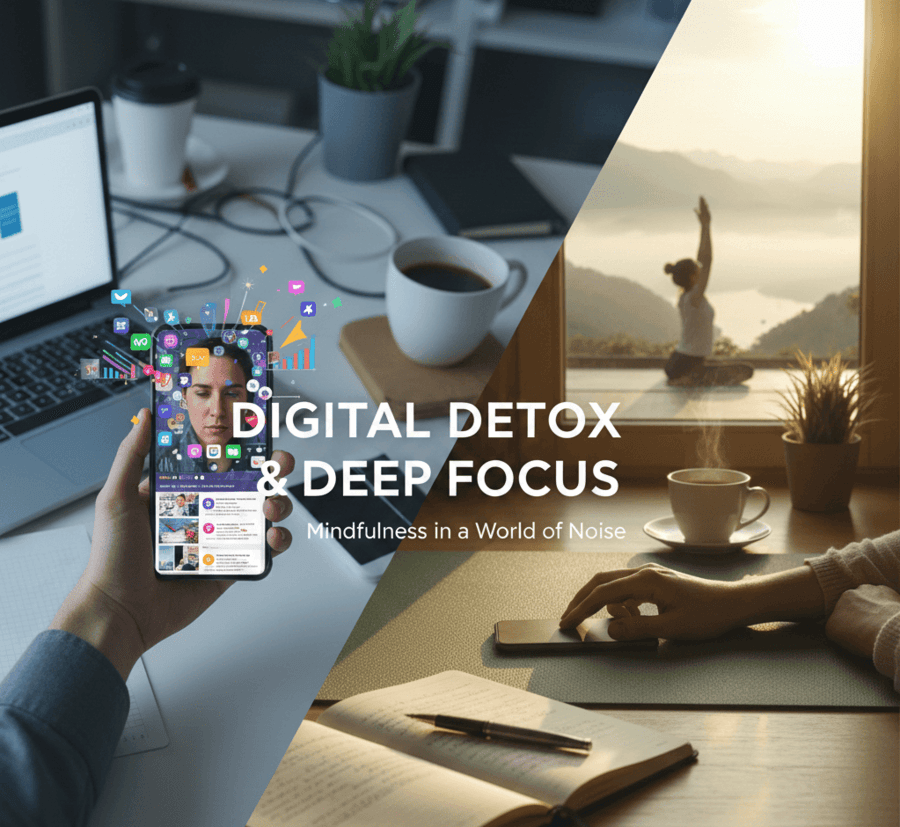How to manage digital overload and boost concentration
Gabriele Viti | 11-21-2025 | 5 min.

More than a digital detox: daily strategies to reclaim your mind through slow routines, hobbies, and wellness.
We live in an age of digital abundance. While immediate access to an infinite flow of information is an invaluable resource, it also presents a constant challenge: Digital Overload and the resulting loss of concentration. The average user is bombarded with thousands of stimuli every day, and our brains, not designed to process such volume, react with stress, anxiety, and reduced productivity. Completely disconnecting is not always feasible, especially for those working in the tech sector, but learning to manage this tide is essential. It's not about abandoning technology, but mastering it, creating an ecosystem where work and mental well-being can coexist. In this article, we will explore how to escape the cycle of distraction not only by filtering the sources of digital noise, but above all, by adopting active strategies that strengthen our minds: a conscious morning routine and the integration of physical activities and offline hobbies.
The Silent Impact of Interruptions
Concentration is a limited resource. Every notification, every interruption—whether an email or a chat message—carries a high cognitive cost. Studies on the "psychology of interrupted work" show that, although we may complete an interrupted task faster (due to the rush to catch up), this comes at the expense of a significant increase in stress and mental load. The most alarming fact? After being interrupted, it can take up to 25 minutes to return to a state of deep concentration.
The first step is to recognize our primary sources of overload:
- Email and Chat: The obsessive need to check new communications (often fueled by FOMO or the fear of missing an urgent matter).
- Social Media: Platforms designed for maximum engagement, which trigger a dopamine loop and irreparably fragment our attention.
- Notifications: The constant "Pavlov's bell" that distracts us, reducing the effectiveness of our work.
Strategic Disconnection: Not Just Eliminating, but Replacing
Simple disabling rules (such as muting group chats or setting specific times for emails) are an excellent starting point. But the key to truly boosting concentration is to replace digital time with activities that nourish the mind and body.
This is where three pillars come into play: your morning routine, sports, and hobbies.
1. Redesigning Your Morning Routine
Many professionals start their day by jumping directly into digital chaos, checking emails and social feeds before even getting out of bed. This sets the day's tone as reactive, anxious, and already overloaded.
Adopt a Slow, Non-Digital Routine:
- Avoid Immediate Immersion: Keep your phone in airplane mode for the first hour after waking up. Your mind should be processing its own thoughts, not those of others.
- Light Movement or Manual Activity: Instead of turning on the PC, engage in an activity that involves your body or hands: stretching, light yoga, calmly preparing breakfast, or doing a small manual activity like tidying the garden or coloring. This calms the nervous system.
- Intentional Planning: Use a notebook and a pen to organize your day. Set goals not only for work but also for your well-being (e.g., "30 minutes of walking," "screen-free dinner").
2. The Power of Offline Sports and Hobbies
Non-digital sports and hobbies are your secret weapon against overload. These activities act as a true cognitive reset.
When you engage in a physical activity or a manual hobby (like gardening, painting, cooking, or a board game), you activate different brain circuits from those involved in digital multitasking. Attention is focused on the body, the breath, or the creation of something tangible.
- Sports as Moving Meditation: Activities like running, climbing, swimming, or hiking require you to be fully present in your body and surrounding environment. You cannot think about emails when you are halfway up a climb. This forced detachment not only reduces stress but also improves blood flow to the brain, subsequently boosting your concentration capacity.
- Mind-Releasing Hobbies: Manual or creative activities stimulate lateral thinking and allow the mind to wander productively (the so-called default mode network). When you return to your digital work, you will find yourself more lucid, creative, and capable of deep work.
Conclusion
Your attention is your most valuable resource in the digital economy. Managing Digital Overload is not an act of deprivation, but an investment in your productivity and happiness.
Start integrating these principles today. Set well-being goals alongside performance goals. Redesign your morning with slowness and intentionality. And most importantly, remember to do one thing that takes you completely away from a screen every day. When you return to your computer, you will no longer be the victim of technology, but its master, armed with renewed concentration and a clearer mind.